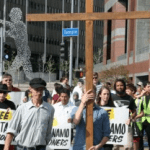 Living Stations of the Cross – Connecting an ancient practice of remembrance with the suffering in today’s world
Living Stations of the Cross – Connecting an ancient practice of remembrance with the suffering in today’s world
Walking the Catholic Worker Stations of the Cross, one can’t help but think of Jesus in the Upper Room, aware of his impending death, trying to sum up his teachings to his beloved disciples, one final time. He gives them a single commandment to follow, as if speaking to a group of children at the end of the school year: If you don’t remember anything else I’ve taught you, remember this one thing …
This is my commandment: Love each other in the same way I have loved you. There is no greater love than to lay down one’s life for one’s friends. (John 15:12-13)
The disciples are left with the greatest paradox: Only through death there is life, only through sacrifice there is love. But what touches me so profoundly is how Jesus died; and not only that, butwhy the Triune God allowed such a horrific death for himself.
The Roman soldiers could have stabbed Jesus with a sword, killing him instantly, or the angry crowd could have quickly beaten him to death. But Jesus did not choose the “easy” way out.
Rather, Jesus chose to endure what the poorest of the poor endure daily, and what society’s most reviled members — the homeless, the diseased, the criminals, the foreigners — are forced to endure.
Jesus told his disciples that people will ask on the Judgment Day, “‘Lord, when did we ever see you hungry or thirsty or a stranger or naked or sick or in prison, and not help you?’ And he will answer, ‘I tell you the truth, when you refused to help the least of these my brothers and sisters, you were refusing to help me.’” (Matthew 25:44-45).
Let us recount the story of Jesus’ Passion, but this time, contemplate how it parallels Matthew 25, how Jesus chose to truly become “the least of these.”
Jesus is arrested on false accusations, literally sold out by his friend, and subsequently beaten and mocked by the Roman military. Without access to a lawyer, Jesus is then interrogated by a council of high priests, the defenders of Jewish law, many of whom have already bribed witnesses to speak falsely against Jesus. When Jesus rejects the council’s corrupt authority, refusing to answer their questions, he is pronounced guilty of blasphemy and is beaten again.
Jesus is then taken, in pain, tired and without food or water, to Pilate, the Roman governor. Jesus, like his Jewish brethren, is a foreigner in his own land, a foreigner to Pilate. But even though Pilate believes in Jesus’ innocence, he is still influenced by public opinion. In order to appease the angry masses, riled up by the Jewish priests, Pilate orders Jesus flogged. It is too late. Caught up in bloodlust, in mob mentality, the public demands the death penalty. When Pilate argues that there is no evidence against Jesus for such a sentence, the people threaten Pilate’s job. Fearing the loss of his position, his authority, Pilate saves his own head by giving Jesus over to a lynch mob.
But first the Roman soldiers want more. As if they haven’t abused Jesus enough, the whole regiment is called upon to beat him and mock him, dressing him up like a plaything, bowing before him blasphemously.
Regular people are swept up into the bloody drama, reveling in Jesus’ torture; surrounding him on his way to Golgotha; jeering and laughing; treating his impending crucifixion like sport. The death penalty is not hidden from the public, but ominously flaunted. Jesus suffers unspeakably, nailed and bound to a wooden beam, dying the slow death of fluid filling his lungs, eventually drowning from an inner flood. He hangs there, amongst the criminals, on the outskirts of the city, cruelly stripped of his garments in front of his mother, his friends, the weeping women. Even after he dies, a soldier desecrates his corpse by stabbing his side, while other soldiers disgracefully gamble for what is left of his clothes.
What similar situations would Jesus find himself in today? Would he have been tortured at Abu Ghraib? Is he being held without charge or trial at Guantanamo Bay? Are the police beating him, interrogating him, asking him to turn in his friends and acquaintances so his time in prison will be reduced? Or is he already in prison, never knowing when he will be beaten or raped by fellow inmates? Was he left in solitary confinement for 41 years, like Herman Wallace, before dying? Is he an imprisoned undocumented immigrant, with no right to a court-appointed attorney, torn from his children, who are U.S.-born citizens? Is he being sold as a sex worker for “30 pieces of silver”? Is he a homeless man ridiculed day after day, a disabled child without friends, or someone shunned by society for having a mental illness?
Reciting the Nicene Creed we profess, “For our sake [Jesus] was crucified under Pontius Pilate, he suffered death and was buried…”
For our sake. All our brothers and sisters. The hungry, the thirsty, the stranger, the naked, the sick, and even those in prison. The honored and the reviled. Jesus chose to die as one of “the least” in order to love us all.







0 Comments